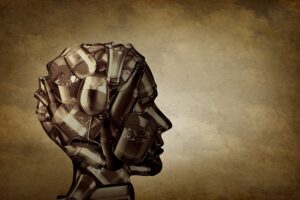For the longest time, alcohol has been used to achieve the desired effect. Whether it be winding down with friends, or grabbing a brew after a long day of work, the substance has been a cornerstone of social life for millennia. There are, however, many questions surrounding the substance. For example, is alcohol really a depressant, or is it a stimulant?
What is the Difference Between Stimulants and Depressants?
Stimulants and depressants work in two very different ways; they have two distinctive functions. There is a complex explanation, and a simpler explanation. The simpler explanation is that one kind of substance heightens your awareness and attention while the other helps you relax. This, however, may be a bit of an oversimplification. There’s more to stimulants and depressants than just heightening attentiveness and bringing a person down to be more relaxed. What happens in the brain deserves a lot more credit than a simple explanation.
What is a Stimulant?
 A stimulant is a kind of substance that enhances the user’s attentiveness, alertness, and overall brain function. When someone consumes a stimulant, the amount of dopamine and norepinephrine delivered to neurotransmitters increases. In layman’s terms, it helps the user concentrate and keeps energy levels up.
A stimulant is a kind of substance that enhances the user’s attentiveness, alertness, and overall brain function. When someone consumes a stimulant, the amount of dopamine and norepinephrine delivered to neurotransmitters increases. In layman’s terms, it helps the user concentrate and keeps energy levels up.
Most often, when someone is trying to alleviate symptoms of ADHD, they’ll take stimulants like Ritalin or Adderall. These medications are typically prescribed by doctors to treat attention disorders. There are a vast number of people who take stimulants to either increase their energy, stay awake, or pay attention; any stimulant or other prescription medication should always be closely observed by the care of a medical professional.
What is a Depressant?
Depressants are substances that relax a person when they take them. Most often, those who use them suffer from anxiety disorders; however, that’s not to say they’re not abused by those who want to abuse them. Depressants are among the most used substances in the world, mostly because of their success in suppressing the central nervous system.
Depressants should always be taken under the supervision of a medical professional because of their addictive potential. The way they work is by attacking neurons in the central nervous system. This causes a sense of drowsiness and relaxation. Some examples of depressants include the following:
Is There a Link Between Alcohol and Dangerous Behavior?
There is a link between alcohol abuse and dangerous behavior. This happens when a person’s blood-alcohol concentration rises to an excessive level. Most often, this dangerous behavior is expressed sexually. This same kind of behavior is present in those who abuse meth.
Not only is sexual behavior displayed dangerously, but alcohol abuse can lead to other types of dangerous actions. Some of these behaviors may seem more obvious, like drunk driving. Sometimes the actions are less obvious and more ambiguous, causing a snowball effect; this could become so disastrous that it has a negative impact on a person’s quality of life. Even worse, it could prove detrimental.
How Does Alcohol Work in the Brain?
 The way alcohol works with the brain is certainly interesting. One might think that alcohol is exclusively a depressant because of the way it makes people drowsy. When a person consumes alcohol, dopamine is delivered to the brain, giving the person a sense of satisfaction. However, there are certain parts of the brain that feel the stimulating effects of alcohol, like the striatum. In this particular area of the brain, a person will not feel the depressant effects of alcohol.
The way alcohol works with the brain is certainly interesting. One might think that alcohol is exclusively a depressant because of the way it makes people drowsy. When a person consumes alcohol, dopamine is delivered to the brain, giving the person a sense of satisfaction. However, there are certain parts of the brain that feel the stimulating effects of alcohol, like the striatum. In this particular area of the brain, a person will not feel the depressant effects of alcohol.
For those who drink extensive amounts of alcohol, stimulation does not persist. For them, the depressive aspect of alcohol use is more prevalent than anything else. Naturally, alcohol produces more depressive effects than it does stimulative.
Why Do I Feel Energy When I Drink?
It’s not uncommon for people to not feel the depressive effect of alcohol. Some have even noted that they feel more stimulated when they consume alcohol. When alcohol affects a person this way, they usually feel happier after one drink. Sometimes two or three will help them feel more energized.
It’s no secret that alcohol abuse increases a person’s confidence and recklessness. It also goes a long way in improving a person’s mood. This is because when alcohol enters the body, dopamine is released to the brain, then triggering the pleasure center. For some, even the thought of alcohol will have them experiencing a sense of satisfaction, leading them to pursue the substance itself.
So, where does the spike of energy come from for those who feel it after drinking alcohol? Some studies have shown that it stems from a byproduct of alcohol metabolism. This byproduct is called acetate, and the acetate chemical causes a person’s energy to spike.
Is Alcohol a Stimulant and a Depressant?
One could argue that alcohol is both a stimulant and a depressant. With all the research that has been conducted over the years, it certainly wouldn’t be unfounded. But formally, how could alcohol be both a depressant and a stimulant at the same time? In short, they’re not mutually exclusive, but there is certainly a more well-rounded explanation for it all.
How is Alcohol a Depressant?
Alcohol is a depressant because when someone consumes an abundance of it, it has a sedative-like effect. The brain slows down and relaxes due to the neurotransmitter gamma-aminobutyric acid (GABA) being depressed. Because these neurotransmitters are depressed, experts are more inclined to classify it as a depressant.
Can Someone be Stimulated by Alcohol?
The question of whether or not alcohol is a stimulant is a firm no; as to whether or not alcohol can stimulate a person, the answer is… sometimes. There’s no denying the sedative effects of alcohol, but there does exist the possibility of alcohol having a stimulating effect. The stimulating effect of alcohol, however, does not last very long. Alcohol does more to slow down motor function, diminish judgment, and impact cognitive function.
The Sedative Effect of Alcohol
The sedative nature of alcohol makes it easy for those using it to feel drowsy; this is why so many people drink before bed. Having a few drinks will increase the likelihood of falling asleep quickly. As previously mentioned, it is because of the neurotransmitter, GABA, being depressed that people begin to feel drowsiness.
As sleepy as someone may feel consuming alcohol before bed, it is likely that doing so would lead to the following:
- Not feeling well-rested
- Interrupted REM sleep
- Interrupted circadian rhythms
- Breathing trouble
- Constant bathroom trips throughout the night
Why Else is Alcohol a Depressant?
Alcohol is a depressant primarily because of the drowsiness and the way it slows down brain activity. However, that’s not the only reason. Alcohol also has the potential to cause a person to become depressed. This is because, over time, the dopamine doesn’t hit the same. Therefore a person’s dopamine levels start to diminish. This has more of an impact than just feeling sad; it affects motivation, fatigue, and loss of interest in activities a person once enjoyed. Sometimes the depressive effects could last longer than a few weeks.
All in all, alcoholism and depression are linked, mostly because of how it affects the brain’s pleasure center. Sometimes, a vicious cycle will ensue, leading a person to drink more to cope with their overwhelming depression. Regardless, there is no doubt that depression could be categorized more so as a depressant than a stimulant.
Alcohol and Substance Use Disorder
Sometimes, people become depressed as a result of alcohol consumption; this could be a strong indicator of substance use disorder or alcohol use disorder. Some studies have indicated that when a person is diagnosed with substance use disorder, they experience severe depression.
Depression, or major depressive disorder, is among the most common mental health disorders for those who suffer from addiction. In fact, 33% of those who receive treatment for their substance use disorder also suffer from depression. To put it in layman’s terms, one feeds off the other, and when this happens, a person’s condition worsens.
Is There Treatment for Alcohol Use Disorder?
Regardless of whether or not alcohol is a depressant or a stimulant, one thing is for sure: if someone is struggling with a substance use disorder, it is imperative to seek treatment. Substance use disorder affects those who are addicted and those around them in immeasurable ways. Some treatment options might be better for a particular individual than others, but that should never stop a person from trying. Some options for addiction treatment include the following:
- Inpatient treatment
- Outpatient treatment
- Medically assisted detox
- Therapy
- 12-step groups
Magnolia City Recovery is Here to Help
Suffering from a substance use disorder is not easy. Alcoholism has a way of latching onto whatever it can and sinking its claws deep into a person’s livelihood. For those who need help with their addiction, there are options available. At Magnolia City Recovery, our utmost concern is that each person who walks through our doors is treated with the best in professional care. We aim to treat the individual first, catering to their unique needs. If you or a loved one needs help and would like to find out more, you can contact us here.

















